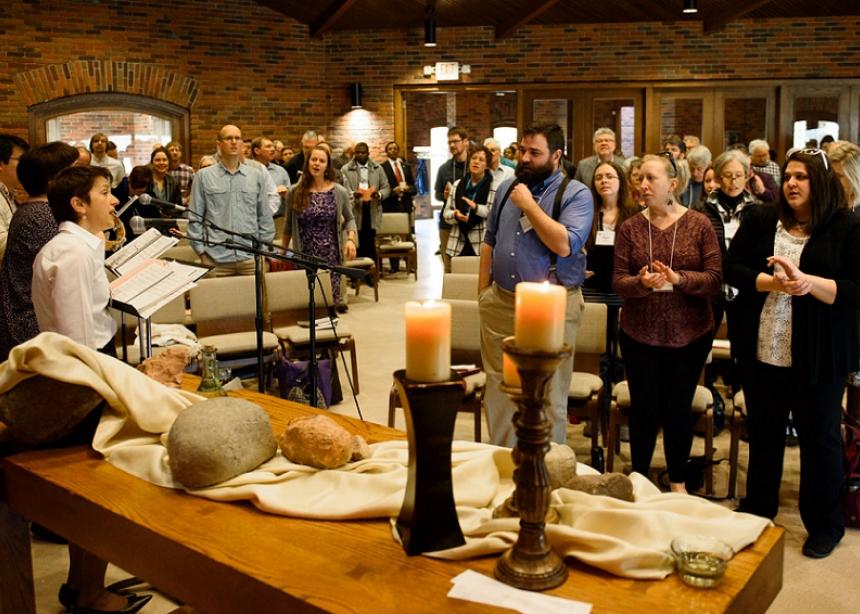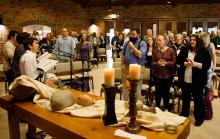With contentiousness and fracturing in the body of believers, and hostility and injustice all around, these are difficult days for church leaders, who are supposed to provide guidance for people struggling with the trials of the times while at the same time often wrestling with their own challenges.
“How do we deal with our anxieties and exhaustion? How do we learn to trust God again?” asked Sara Wenger Shenk, president of Anabaptist Mennonite Biblical Seminary (AMBS), in her welcome to participants at the seminary’s annual Pastors and Leaders Conference on Feb. 26, 2018, whose theme was “For such a time as this.”
More than 160 registrants from 14 U.S. states and two Canadian provinces—representing 11 denominations—sought renewal through plenary teaching sessions, workshops and worship, as well as fellowship.
Each of the four plenary speakers provided words of encouragement to help participants sustain their faith while facing adversity.
“This is a frightening time,” admitted Ben Ollenburger, AMBS professor of biblical theology, during his opening-night presentation. “We have much to be anxious about . . . and we have much to fear.”
“But I want to say, ‘Fear not, for the Lord is with you,’” he continued. “Nothing is impossible with God.”
Drawing from the story of the Israelites exiled in Babylon, he said, “If ever there was a lost cause, it was Israel,” he said, adding, though, “that you’re defeated doesn’t mean God is not sovereign. For Israel to see, they first had to become blind.”
Janna Hunter-Bowman, AMBS assistant professor of peace studies and Christian social ethics, shared from her time as a peace worker with Pentecostal congregations in violence-wracked Colombia. She emphasized the possibilities for faithfulness during anxious times, telling of one community that intervened to save a member targeted for assassination by paramilitary forces by smuggling him away. When asked why they did so, the local pastor said, “We had nowhere else to go and no one to turn to but God.”
“Such participation with ultimate power allows them . . . a sense of agency in a situation of terror and chaos,” she said. “New avenues of response open up because of the knowledge they possess . . . of the active working of the Spirit.”
In such situations, the church can be a “point of reference” for others in the community, she said. Because the church members didn’t flee in the face of the paramilitary, others didn’t either. She called it “theopolitical power,” independent of state forms of politics. It’s something she wants to see replicated in the North American church. But it requires becoming part of the politically and socially marginalized. “The state has absorbed so much of our imagination of how change happens,” Hunter-Bowman said. “That’s what I want to disabuse.”
Dan Schrock, a spiritual director, pastor and AMBS sessional instructor, introduced “prayer of beholding” as a way to reduce anxiety. He said it employs both one’s physical eyes and the “inner eyes of our spiritual imagination.”
He defined “beholding” as “paying attention.” In practising such prayers, he said, “we are caught up into something else; it might be a delightful child, a dear friend, an exquisite flower or a prairie that stretches on for miles until it kisses the sky. To say it more theologically, in the prayer of beholding, we are transfixed by the glory of God, which is constantly being refracted into the world around us.”
“In moments of beholding, we forget our agenda . . . pulled toward awe and wonder and delight in the resplendence of God,” Schrock said, but he cautioned that prayers of beholding don’t resolve or eliminate the issues causing stress.
Rebecca Slough, AMBS academic dean, shared about several “roots” that nourish her mind and spirit, such as trust, discernment, hope and the invitation to confront truth, and led the group in singing a hymn connected with each one. She encouraged her listeners to consider which practices nourish them.
She encouraged those present to learn from people on society’s margins to have hope in the Lord. “They know how to hang on, especially to the hope for justice, that many of us have never needed to develop,” she said.
Christians need to challenge the conventional and take risks, she said, just like Jesus Christ, Anabaptist martyr Dirk Willems and religious leaders Martin Luther King, Jr. and Desmond Tutu did.
Slough also called for more celebrations of the Lord’s Supper, calling it a ceremony of hope. “[Jesus Christ] is our hope until the kingdom comes,” she said.




Add new comment
Canadian Mennonite invites comments and encourages constructive discussion about our content. Actual full names (first and last) are required. Comments are moderated and may be edited. They will not appear online until approved and will be posted during business hours. Some comments may be reproduced in print.